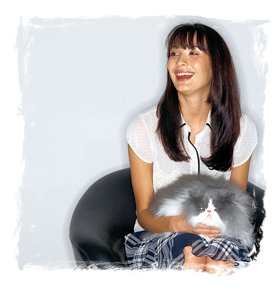Most people are not aware of how important body language is, and it can be used in a positive manner or negative manner when it comes to influencing decisions. Most of it occurs at an unconscious level and that really means that we just aren’t paying attention to it. If you have ever been around someone that you just kind of get that feeling of, “ew, I don’t know what it is, but I just don’t want to be around this person,” chances are it is almost entirely because of body language that you are witnessing, but weren’t really paying attention to.

Sit well and leave the cat at home, okay?
Fortunately, the major aspects of body language can be controlled and moves towards the output that you are seeking. It’s something that requires some practice and attention, but, if you keep these couple of tips that I am about to give you in mind, you will be well on your way to projecting the more useful and positive body language communication.
1) Sit Upright In Your Chair
Uprightness, and, let’s say professional, or good posture when sitting, projects this feeling of interest and that you really are willing are open to what the interviewer is saying to you. If you are slouching and maybe leaning all over the place, you just get this different feeling, like, what, what do you want to tell me? I will listen to it, but I’m not all that interested.
By sitting up, being focus and maintain the body language that says, Yes, I’m awake and I am paying attention to you, you will project an overall understanding that you do have a vested interest in what happening right here. Let the interviewer know this by keeping that good posture and not being a “slouchy grouchy.”
2) Keep Your Eyes On The Interviewer
I have thrown out percentages before, and you have probably seen them elsewhere, but the main point it, a majority of the time, when appropriate, maintain that eye contact, as this communicates interest and attention and overall understanding of what is going on.
It is OK, to look up or around when you are seeking answers or a topic has changed or there is a quiet time, but try to maintain a majority focus on the face, particularly the eye region of your interviewer. Now, if you are uncomfortable with the direct eye contact, and are outside a 3 to 5 foot distance, you can focus right about the center of the forehead and get away with that.
However, if you are any closer it is obvious that you are not focusing on the eyes, and it looks kind of weird. If you can get comfortable at looking people in the eyes, go for that, if you can’t, use other tactics and maintain your distance.
3) Watch Your Hands
There is a safe spot for hands, it’s your upper torso, anywhere else, and they are probably doing something that is distracting and communicating things that you don’t want. For instance, pretty much anything that you touch or do with your face, neck, ears, and the whole head region, projects a nervousness, fidgetiness and overall air of unsure qualities. This also includes, fiddling with stuff in your pockets, your feet, and your fingernails; basically, anything outside of this torso box is not a good idea.
You may not notice it, but you pretty much always do this, like I am doing here when I’m talking, but anytime when you feel your hands get outside of this invisible box that you need to pay attention and bring them back to the box. Keep that in mind.
4) Put On A Smile On Your Face
Even if it’s a phone call interview, put a smile on your face. The voice that you project does change when you are smiling, the shape of your face, your muscles, your overall path of voice changes by putting a smile on your face.
An in-person interview it is especially important. Yes, there are all kinds of rules about how long a smile should be, how big a smile should be, how the eyebrows look when it’s a genuine smile, and all this stuff. For this level of communication I don’t think you need to worry about all the details. When it appropriate, when it feels natural, smile, be friendly, be interested and communicate that, Yes, you are happy to be here, whether on the phone or in-person, it will help.
Body Language Is Quiet, But Effective
Body language is a vast and very important subject. In order for you to be well above the rest in your interviewing journey, the (4) tips that we just talked about, will definitely help.
- Make sure you sit upright in your chair
- Maintain eye contact
- Watch your hands
- Keep that smile on your face no matter what
Take care of these things, be more confident and project that overall interest by your unconscious signals and body language. These are things that can be taking care of with practice and a little bit of skill and will definitely help you out in your next interview.
[cta_interviews]